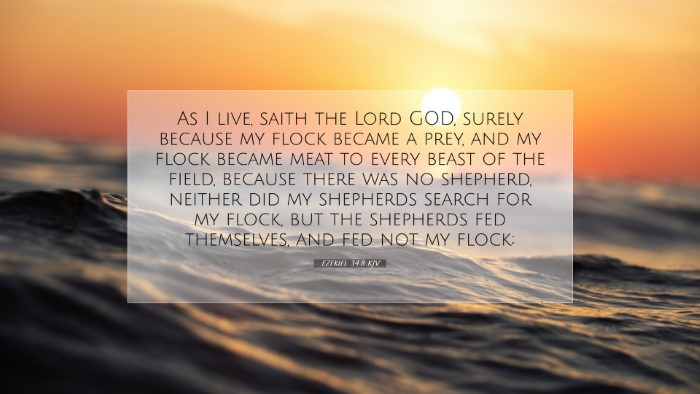Ezekiel 34:8 - Commentary Summary
Ezekiel 34:8 states, "As I live, saith the Lord God, surely because my flock became a prey, and my flock became meat to every beast of the field, because there was no shepherd, neither did my shepherds search for my flock; but the shepherds fed themselves, and fed not my flock."
Contextual Overview
This passage is situated within a prophetic oracle where God indicts the leaders of Israel, referred to as "shepherds." The imagery of shepherds and sheep is prevalent in Scripture, representing the relationship of care and guidance expected from leaders toward their people. In this particular context, however, the shepherds have failed in their responsibilities, leading to the destruction and scattering of the flock.
Analysis of Key Themes
-
The Role of Shepherds:
Adam Clarke emphasizes that the shepherds symbolize the leaders of Israel, who are responsible for the welfare of the people. They are expected to guide, protect, and nurture, just as shepherds do for their sheep.
-
Divine Judgment:
Matthew Henry notes that the Lord's assertion, "As I live," underscores the certainty of divine judgment. The neglect of the leaders invokes God’s righteous anger, suggesting that those entrusted with authority will face accountability.
-
The Condition of the Flock:
Albert Barnes points out that the flock has been made prey to wild beasts, symbolizing the dangers that come from spiritual neglect. The failure of the shepherds to protect their sheep has led to severe consequences, reflecting the broader spiritual condition of Israel.
-
Self-Serving Leadership:
Henry critiqued the shepherds for "feeding themselves," indicating a self-centered approach to leadership. This was not just a physical hunger but also a spiritual one, where leaders neglected their duties for personal gain.
Theological Implications
This passage serves as a reminder of God’s expectations of leaders within the church and society at large. It emphasizes the importance of selflessness, accountability, and the grave consequences of failing in roles of guidance and protection. The neglect of spiritual leadership leads not only to the demise of community but potentially to divine judgment.
Lessons for Today’s Leaders
-
Responsibility:
Current leaders in churches and communities should heed the warning presented here. Their responsibility is not only to lead but to ensure the spiritual and physical well-being of those they serve.
-
Self-Examination:
Leaders should regularly assess their motives and actions: Are they serving the flock, or are they merely seeking personal gain? This reflection is crucial in maintaining integrity and the effective stewardship of their calling.
-
Community Care:
The health of any community reflects the quality of its leadership. Pastors and leaders must actively engage in the lives of their congregation, fostering care and protection against spiritual and moral dangers.
Conclusion
Ezekiel 34:8 is a powerful and sobering verse that speaks to the heart of leadership within the context of faith. From the insights of Matthew Henry, Albert Barnes, and Adam Clarke, the message is clear: true shepherds are called to serve, protect, and lead their flocks with unwavering dedication, embodying the qualities that reflect Christ’s love for His Church. The Church today cannot afford the luxury of negligent leadership; instead, it must strive for integrity, compassion, and a focus on the well-being of all its members.


